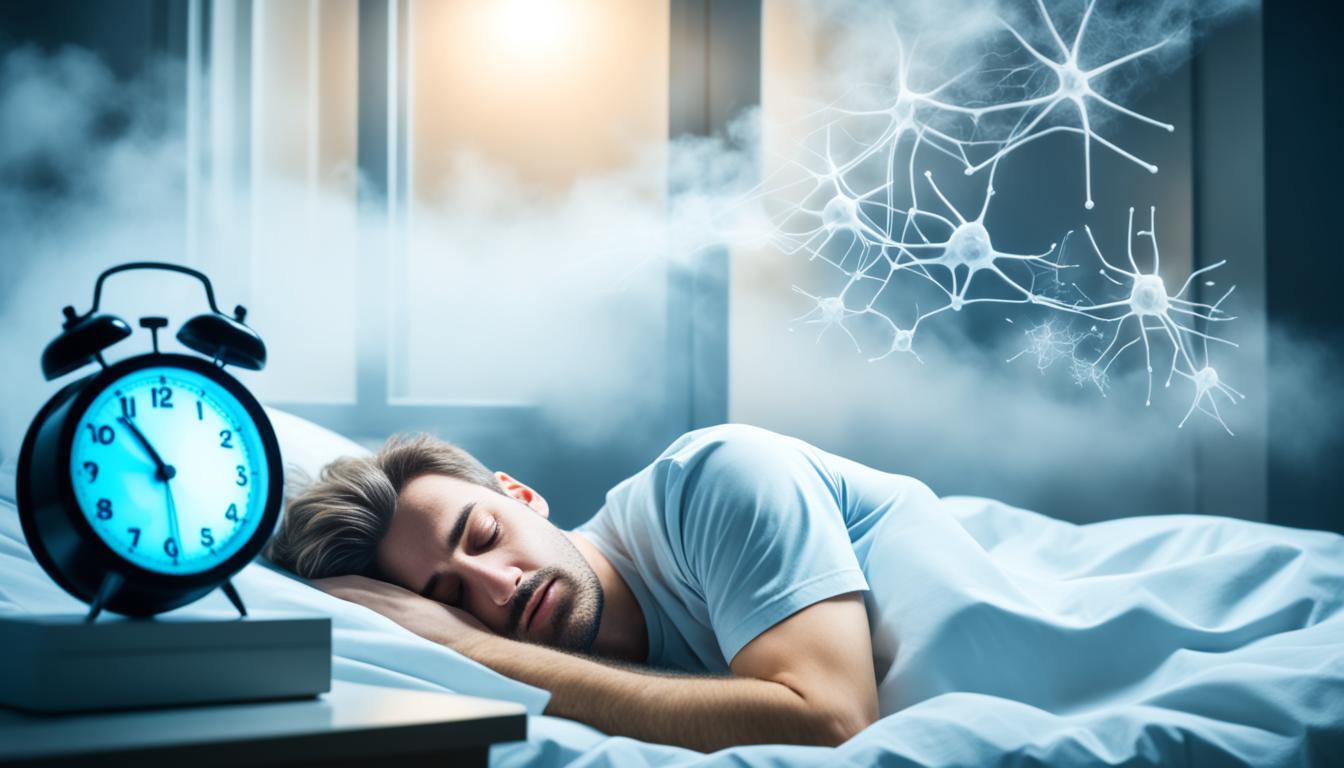Idiopathic hypersomnia is a type of sleep disorder that affects from 4% to 6% of people. It’s known for making someone feel very sleepy during the day. This condition can really affect how someone lives their daily life. For many with this disorder, being too sleepy during the day causes problems at work or can even lead to accidents.
The causes of idiopathic hypersomnia aren’t always clear. Doctors use many methods to understand why someone might be too sleepy during the day. These include talking with the person, using questionnaires, keeping sleep diaries, and doing various tests. Idiopathic hypersomnia can also show itself in different ways, like narcolepsy or sleepiness caused by certain medications or diseases.
Key Takeaways:
- Idiopathic hypersomnia is a sleep disorder characterized by excessive daytime sleepiness (EDS) that affects 4% to 6% of the population.
- It is a neurological condition that can significantly impact an individual’s daily life.
- Common symptoms include constant complaints of excessive daytime sleep or sleepiness.
- Diagnosis involves various methods such as interviews, questionnaires, sleep diaries, polysomnography, and psychomotor tests.
- Hypersomnia can be classified into different syndromes.
Diagnosing Idiopathic Hypersomnia and Challenges
Diagnosing idiopathic hypersomnia can be hard. This sleep issue is often mistaken for other problems like narcolepsy. Specialists use sleep studies to find out what’s going on.
This sleep disorder is not common, and its symptoms can look like something else. It often gets mixed up with depression or anxiety. Getting the right diagnosis can take years.
Tests that look at how you sleep and your symptoms are used to diagnose this condition. But these tests aren’t always perfect.
Challenges in Diagnosing Idiopathic Hypersomnia
- Misdiagnosis: It’s easy to mix up idiopathic hypersomnia with other sleep issues, especially narcolepsy.
- Low Prevalence: Idiopathic hypersomnia is rare. So, doctors may not be very familiar with it, leading to mistakes.
- Clinical Heterogeneity: Symtoms can be different from person to person. This makes it tough to pinpoint the problem.
- Overlapping Symptoms: Symptoms like being tired all the time can also mean you have depression or anxiety. This makes it hard to diagnose.
Sleep Studies and Diagnosis
Sleep studies are key in finding out if you have idiopathic hypersomnia. They watch your brain waves, how you breathe, and your heart while you sleep.
This data helps doctors figure out if it’s idiopathic hypersomnia or something else. But, because idiopathic hypersomnia is unusual, diagnosis can be tricky.
Things like sleeping a lot and not feeling rested after a nap also help in making the diagnosis.
Managing Idiopathic Hypersomnia and Comorbidities
Idiopathic hypersomnia is a sleep disorder. It makes people very sleepy during the day. It often comes with other health problems. These additional problems need care too.
Many with idiopathic hypersomnia also have sleep apnea. Sleep apnea causes breathing pauses during sleep. It makes daytime sleepiness even worse in those with idiopathic hypersomnia.
People with idiopathic hypersomnia face a higher heart disease risk. This risk seems tied to body inflammation. Keeping an eye on heart health is crucial for these individuals.
Headaches, even migraines, are common among those with idiopathic hypersomnia. The exact link is not clear. But managing headaches can make life better for these individuals.
Idiopathic hypersomnia can also increase the chance of getting diabetes. This happens when sleep is not normal. It messes with the way the body handles sugar. Keeping blood sugar in check and being healthy can lower this risk.
Depression and anxiety are also often seen in those with idiopathic hypersomnia. Sleep and mood problems affect each other. It’s vital to treat both to feel better overall.
To help people with idiopathic hypersomnia, we need many kinds of help. Using CPAP for sleep apnea, heart and diabetes care, and treating mood issues all matter. They can make life better for people with idiopathic hypersomnia.
Next, we’ll look at how hard it is to diagnose idiopathic hypersomnia. Getting a correct diagnosis is key to better care.
- MedlinePlus – Idiopathic hypersomnia
- National Sleep Foundation – Idiopathic Hypersomnia
- Medscape – Idiopathic Hypersomnia
Conclusion
Idiopathic hypersomnia is difficult to diagnose and treat. It often gets grouped with other sleep problems. Getting the right diagnosis can take a long time.
The main treatment approved by the FDA is Xywav. However, doctors also check for and treat other health issues. These include sleep apnea, heart problems, headaches, diabetes, and mood disorders. These can make the condition more challenging.
Ongoing research on stem cell therapy might lead to new treatment options for idiopathic hypersomnia. It’s important for doctors to keep up with the latest news and treatments. This helps in giving the best care to patients.
Everyone in the medical field needs to keep working on understanding and solving idiopathic hypersomnia. The number of people facing sleep problems, like idiopathic hypersomnia, is growing. It pushes experts to look for new and better ways to help.

